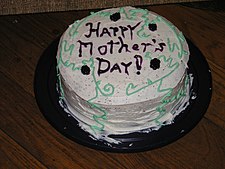This article is about several worldwide days celebrating motherhood. For other uses, see Mother's Day (disambiguation).
| Mother's Day | |
|---|---|
 A homemade cake, one of many ways a family might celebrate Mother's Day, or Mothering Sunday | |
| Observed by | Many countries |
| Type | Commercial |
| Date | Varies regionally |
| Related to | Father's Day, Parents' Day,Children's Day |
The modern Mother's Day is celebrated on various days in many parts of the world, most commonly in May or in March/April, as a day to honour mothers and motherhood. In the UK and Ireland, it follows the old traditions of Mothering Sunday, celebrated in March/April.
Father's Day is the corresponding day for the father.
[edit]Historical antecedents
Lamberts thought[who?] this day emerged from a custom of mother worship in ancient Greece, which kept a festival to Cybele, a great mother of Greek gods.{Encyclopædia Britannica|(1959)Vol.15,p. 849} This festival was held around the Vernal Equinox around Asia Minor and eventually in Rome itself from the Ides of March (15 March) to 18 March.
The ancient Romans also had another holiday, Matronalia, that was dedicated to Juno, though mothers were usually given gifts on this day.
In Europe there were several long standing traditions where a specific Sunday was set aside to honor motherhood and mothers such asMothering Sunday. Mothering Sunday celebrations are part of the liturgical calendar in several Christian denominations, including Anglicans, and in the Catholic calendar is marked as Laetare Sunday, the fourth Sunday in Lent to honour the Virgin Mary and your "mother" church (the main church of the area). Children and young people who were "in service" (servants in richer households) were given a day off on that date so they could visit their families (or, originally, return to their "mother church). The children would pick wild flowers along the way to place them in the church or to give them to their mothers as gifts.[1]









